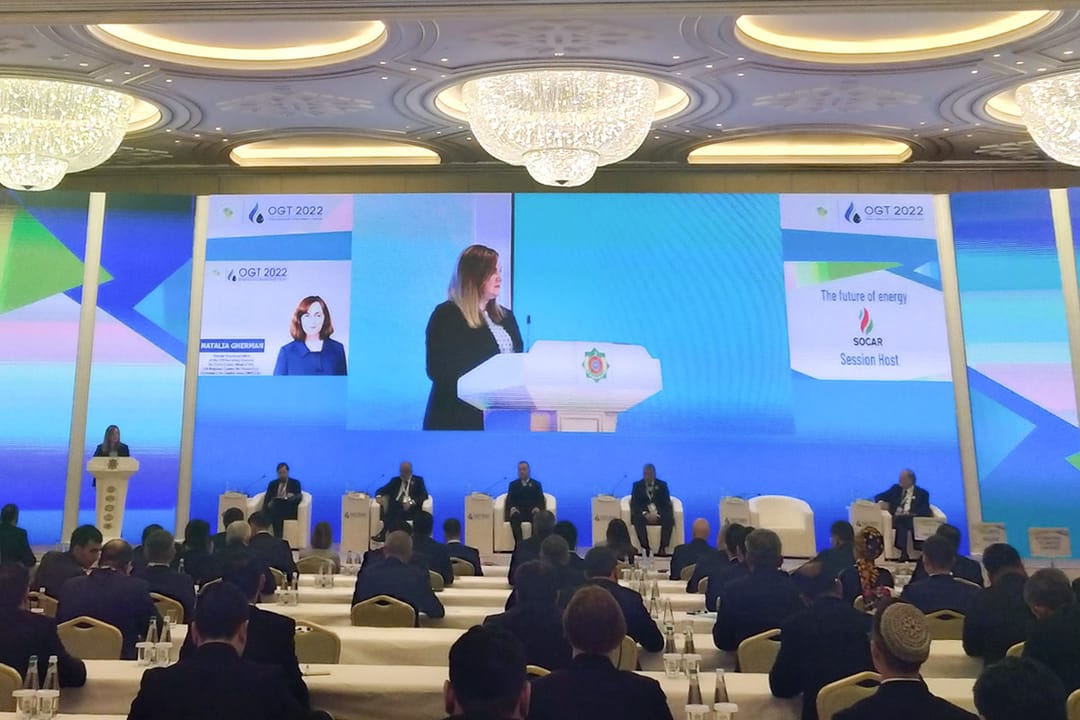The International Conference "Oil and Gas of Turkmenistan" (OGT-2022) started today, at which the Special Representative of the UN Secretary General for Central Asia, Head of the UN Regional Center for Preventive Diplomacy for Central Asia (UNRCCA) Natalia Gherman made Key-note Address.
In her speech, she noted that this Forum is an important occasion to discuss emerging trends and challenges and further support Turkmenistan’s active role in ensuring regional energy security.
Gherman stressed that in spite of troubling global trends and developments in the world, Central Asia stands out as the region where these very tenets of peace and security – multilateralism, solidarity and trust have been cherished and promoted.
"As representatives of business community, you know best that energy is a matter of national and regional security, peace and global stability. It rests at the core of geopolitics because fundamentally energy is the issue of wealth and power, which means it can be both a source of conflict and cooperation. In Central Asia, it has been an issue of cooperation for many decades and it should be only further enhanced”, the Head of the UNRCCA stated.
Gherman noted that Turkmenistan dedicated much time and attention to improving inter-connectivity and economic development at both national and multilateral levels. Its active position on energy and transport diplomacy was shown by the United Nations General Assembly’s adoption of resolutions proposed by Turkmenistan on sustainable transport in recent years.
She also noted Turkmenistan’s efforts in advancing a number of important regional initiatives, which are essential for widening the intra-regional trade.
"Lapis Lazuli" corridor contributes to strengthening economic and transport interaction within a wider geographical area, including but not limited to Central and Southern Asia, Caspian and Black Sea Basins, as well as Mediterranean.
TAPI and TAP projects also serve as vivid examples of Turkmenistan’s energy diplomacy. These initiatives will enhance interconnectivity, economic development and ultimately contribute to sustainable peace within this vast geo-economical and geopolitical space, particularly as concerns the situation in Afghanistan," Gherman stressed.
In her Key-note Address, the Special Representative of the UN Secretary General also raised the topic of climate change, calling it the scourge of our time, as the effects of climate change – extreme weather events, melting glaciers and increased temperatures – are already affecting the regional security and indeed hampering trade and economic cooperation among the countries.
"Central Asia States do realize it and respond by proposing numerous initiatives, including World Water Decades, Aral Sea disaster mitigation measures, activities to address environmental degradation.
The falling cost of renewables and their promise to reinvigorate national economies have incentivized governments to adopt plans for investments in clean energy.
It is commendable that Central Asian countries used the United Nations Climate Change Conference in Glasgow (COP 26) platform to generate opportunities for climate action and sustainable development in their region.
They used this opportunity to present the regional approach to development of renewable energies; phasing out coal power; sustainable and low-carbon agriculture; reducing water consumption, and using waste as a source of energy and bio-waste as a fertilizer.
It serves as an inspiring example of regional cooperation in the face of global challenges," she concluded.

